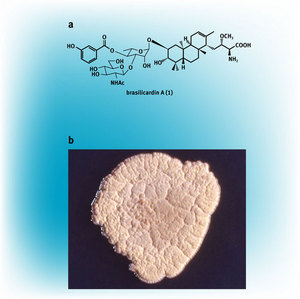Jan. 26, 2007 Research Highlight Biology
Dividing cells stopped in their tracks
A novel compound starves tumor cells and immune lymphocytes
 Figure 1: a) Molecular structure of Brasilicardin A. b) Brasilicardin A is a natural product isolated from cultures of the bacterium Nocardia brasiliensis. © Fig. 1a: Chemistry & Biology/Elsevier/13/1154 (2006).
Figure 1: a) Molecular structure of Brasilicardin A. b) Brasilicardin A is a natural product isolated from cultures of the bacterium Nocardia brasiliensis. © Fig. 1a: Chemistry & Biology/Elsevier/13/1154 (2006).
Cells of the body require energy to divide. This is particularly evident in rapidly dividing cells, such as immune lymphocytes responding to infection. Now, Takeo Usui and colleagues, at the RIKEN Discovery Research Institute, Wako, shed light on a drug that halts dividing cells by literally starving them1.
In addition to immune lymphocytes, cancer cells also divide rapidly. To accommodate such rapid division, both types of cells harvest nutrients—especially amino acids for building proteins—from their surroundings.
Usui and colleagues work with the novel compound Brasilicardin A (BraA), a natural product of the bacterium Nocardia brasiliensis (Fig. 1). “At first, we noticed that BraA inhibited protein synthesis,” recalls Usui. “We speculated that BraA might block cell division by inhibiting uptake of amino acids into cells.” Direct measurement of amino acid uptake confirmed that several essential amino acids could not enter BraA-treated cells.
Usui and colleagues turned to the molecular structure of BraA for further clues. It was known that part of BraA structurally resembles natural amino acids. “We found that the ‘amino acid-like’ component is quite important for BraA’s ability to inhibit cell division,” says Usui.
How? When lymphocytes and cancer cells rapidly divide, internal biosensors monitor when nutrients available to the cell are low. In response, cells produce specialized ‘transport proteins’ that enable uptake of nutrients such as amino acids, sugars and fats.
Most likely, BraA directly blocks the function of one class of amino acid transport proteins and thus “disturbs amino acid metabolism” within the cell, notes Usui. The result is cells that are starved and would die except for their intrinsic ‘stress response’ that staves off death.
In support of those conclusions, Usui and colleagues find that BraA-treated cells contained an activated form of GCN2—a protein that is involved in the stress response that protects cells from amino acid starvation.
“Because all cells require amino acids to live, high concentrations of BraA [if used to treat people] should be toxic. However, dividing lymphocytes and cancer cells have extraordinary amino acid requirements,” says Usui, suggesting that delivery of BraA to dividing cells might not result in toxicity.
The team also has ideas for improving the inhibitory activity of BraA. “We hope that we can obtain more potent, and clinically applicable, inhibitors that will block unhealthy cell division.”
Understanding more about the mechanism by which BraA suppresses cell division may help to design other drugs to prevent organ transplant failure or malignant cancer.
References
- 1. Usui, T., Nagumo, Y., Watanabe, A., Kubota, T., Komatsu, K., Kobayashi, J. & Osada, H. Brasilicardin A, a natural immunosuppressant, targets amino acid transport system L. Chemistry & Biology 13, 1153–1160 (2006). doi: 10.1016/j.chembiol.2006.09.006
